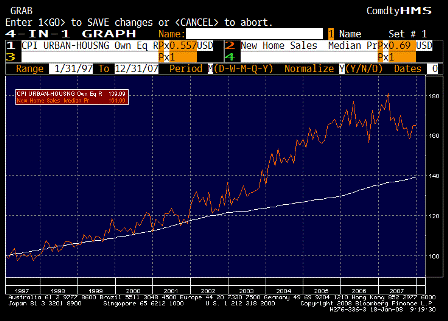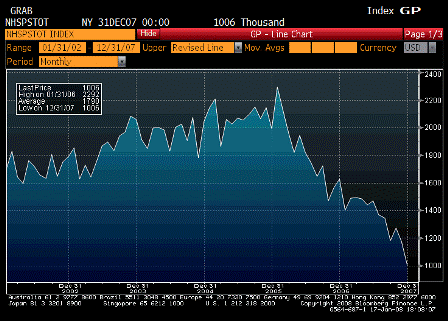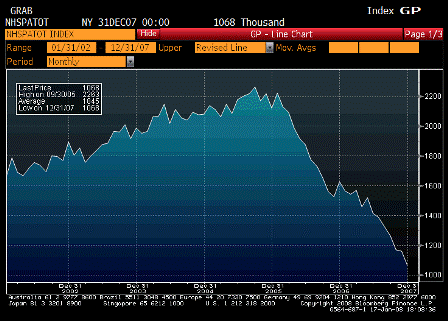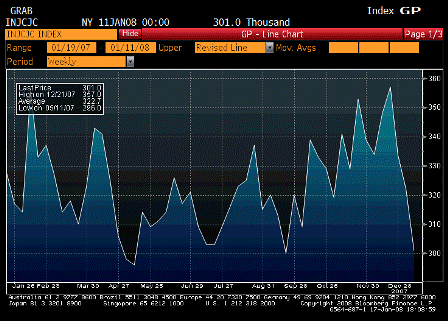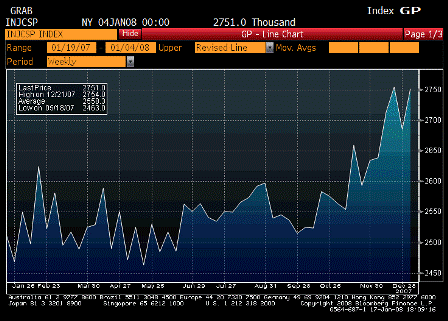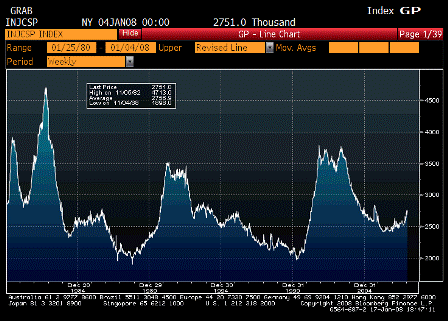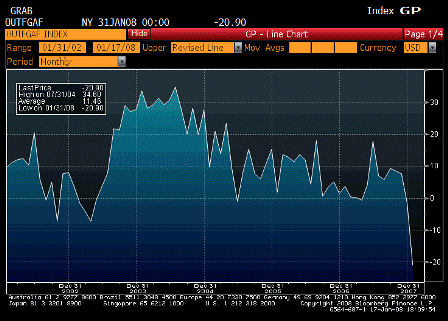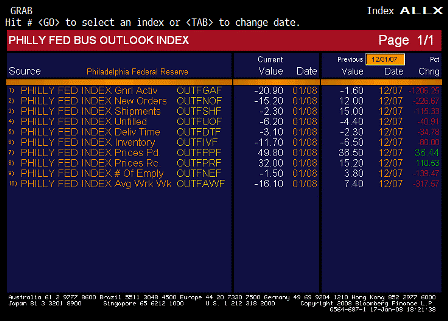Doesn’t get any more hawkish than this.
Well worth a quick read.
Richard W. Fisher
Challenges for Monetary Policy in a Globalized Economy
Remarks before the Global Interdependence Center
Philadelphia, Pennsylvania
January 17, 2008
Thank you, Charlie [Plosser]. I am grateful for the invitation to speak to the Global Interdependence Center.
(NON ECON INTRO SNIPPED)
You’d be hard pressed to find an economist or market operator in this city or anywhere else on the planet who is not concerned about waning U.S. economic growth. Some analysts and commentators sound like Chicken Littles. Others are less excitable, but are nevertheless assuming a defensive crouch. Most are mindful of recent developments in employment patterns, uneven retail sales and downward shifts in shipping, rail and trucking indexes, industrial activity, business capex plans, credit card payables, purchasing manager activity and other carefully watched indicators. These stresses follow on the severe housing downturn and the liquidity bind. There is an increasingly insistent drumbeat urging the Fed not only to not impose contractionary policy on a weakening economy, but indeed to get “ahead of the curve” through further monetary accommodation.
Chairman Bernanke spoke last week and made it clear that the FOMC stands “ready to take substantive action needed to support growth and provide insurance against downside risks,” adding that “additional policy easing may well be necessary.” In short, he made clear that the FOMC does not intend to just squat and wait should economic data and sound risk management signal that monetary accommodation is required.
It needs to be underscored that being proactive and not passive in doing our job does not mean that we will abandon prudent decisionmaking. We are the central bank of the United States, the bellwether economy of the world. Our job is not to bail out imprudent decisionmakers or errant bankers, nor is it to directly support the stock market or to somehow make whole those money managers, financial engineers and real estate speculators who got it wrong. And it most definitely is not to err on the side of Wall Street at the expense of Main Street.
In fact, to benefit Main Street, we have a duty to maintain a financial system that enables American capitalism to do its magic. To this end, we have recently taken steps designed to circumvent
bottlenecks in interbank lendingâ€â€Âsteps that include changing the operation of our discount window and opening a new term auction facility. This facility has provided $70 billion in funds in roughly a
month and will soon provide another $30 billion, and perhaps even more over time if needed.
In setting broader monetary policy and the fed funds target rate, the Fed operates under a dual mandate. We are charged by Congress with creating the monetary conditions for sustainable, noninflationary employment growth. Put more simply, our mandate is to grow employment and to contain inflation. Unstable prices are incompatible with sustainable job growth. Some critics worry that we have forgotten that axiom. We haven’t.
Let me give you my personal view.
In discharging our dual mandate, we must be mindful that short-term fixes often lead to long-term problems. The Fed occupies a unique place in the pantheon of government institutions. It was deliberately designed to be calm and steady, untainted by the passion of the moment and immune to political exigency and influence. Because monetary policy’s effects spread into the economy slowly and accumulate over time, having an itchy trigger finger with monetary policy risks shooting everyone in the foot. Our policy mandate must be discharged with careful and deliberate aim.
In the attention-deficit world of television and Internet commentary, where so-called “instant analysis”â€â€Âan oxymoron if there ever was oneâ€â€Âmakes headlines, it is easy to understand why one might think that the effect of a change in the fed funds rate would immediately alter the dynamic of the economy. To be sure, movement in the fed funds rate, or even no movement at all, may have an immediate psychological effect and influence expectations for future monetary policy action. But the act of changing or not changing the fed funds target rate, in and of itself, has no immediate effect on the economy. Like a good single malt whiskey, the ameliorating or stimulating influence kicks in only with a lag.
The lag time necessary for inflation to respond to policy is especially long. As a policymaker discharging our dual mandate, I am always mindful that in providing the monetary conditions for employment growth, we must not also sow the seeds of inflation that will eventually choke off the very employment growth we seek to encourage. You do not have to be an inflation “hawk” to recognize that would be a Faustian bargain.
Those of you who follow my speechesâ€â€Âprobably a very small number of you with way too much time on your handsâ€â€Âwill recall that I like neither the term “hawk” nor “dove.” I like to think that all FOMC
members are best metaphorically described in ornithological terms as “owls”â€â€Âwise women and men seeking to achieve the right balance in carrying out our dual mandate. To be owlish, and to avoid the
imbalance of emphasis that gave rise to needed harsh discipline imposed by the Volcker FOMC, one has to bear in mind that the seeds of inflation, once planted, can lie fallow for some time, then suddenly burst through the economic topsoil like kudzu, requiring a near-toxic dose of countermeasures to overcome.
In the pre-Volcker era, the Fed had a less-than-admirable record of keeping inflation at bay. But over the past few decades, we have done well enough to both contain inflation and engender growth that far outpaced other advanced economies for a sustained period with only a smattering of short recessions. In short, the Fed has delivered on its mandate.
To be sure, we have been profoundly impacted by the shifting economic dynamics that have complicated our efforts to continue delivering on our mandate. I need not try to convince members and supporters of the Global Interdependence Center that we are living in a globalized world. Increasingly, globalization is blurring economic boundaries. On the inflation front, for example, we have extensive economic playbooks that tell us how to treat the wage–price spiral or cost-push forces in a closed economy. In a closed environment, one would ordinarily expect that a weakening economy would lead, in turn, to a diminution in price pressures. But we have less experience with prescribing policy in an open economy where demand-pull forces come from beyond our bordersâ€â€Âsuch as the burgeoning demand for commodities and food from rapidly growing and newly consequential economies like China, India, Latin America and the countries liberated from the oppression of Soviet communism. These faraway places play an ever-increasing role in determining prices here at home.
Writing in last Sunday’s New York Times, Ben Stein noted this and that the Fed does not have much power to influence the price of oil.[1] He is right. And for that matter, we can’t do much about the external demand impacting the price of foodâ€â€Âwhich, by the way, carries twice the weight of energy in the consumer basket of personal consumption expenditures. But the dynamics of production and demand among the new participants in the global economy nonetheless impact us in different ways at different times. As these new participants joined the global economy, they provided significant tailwinds, helping us grow by providing cost savings, new sources of productivity enhancement and new sources of demand, helping fatten both the top line and bottom line of our businesses while also holding down inflation. Under such conditions, the Fed could operate with a more accommodative monetary policy than what might have been appropriate in a closed economy, without putting upward pressure on inflation. And that is what the Fed did, although some argueâ€â€Âwith the benefit of hindsightâ€â€Âit did so for too long.
I think it is now clear that the winds have shifted. The growing appetite for raw inputs from the new participants in the global economy represents an inflationary headwind that is unlikely to soon abate. The so-called “income elasticity of demand” for energy is 1.2 across a wide range of countries, which is a fancy way of saying that economic theory should lead one to conclude that the demand for energy in, say, China, for example, would begin to grow faster than China’s income growth, which continues to increase at a rapid rate. Put more simply, income growth in China and India and elsewhere, even if it slows from its torrid pace, is likely to continue raising demand for food and energy. There is a risk that upward price pressures will continue to affect American producers and consumers of energy and food products and a continuing danger that overall inflation expectations will drift upward as a result.
If I am correct, then the situation today is the flip side of the 1990s and early 2000s: In delivering on our mandate to be monetary policy “owls,” we will have to err on the side of running tighter policy than would otherwise be justified if we wish to limit upward inflation pressures.
I mentioned single malt whiskey earlier to describe the effective time lags of monetary policy. I realize it is only lunchtime, but let’s return to the economics liquor cabinet for a moment. Inflation is like absinthe. The narcotic allure of inflation is a dangerous thing. It might seem like the remedy to bail out a government or a bad book of business and forget your troubles. Yet our experience in the past has taught us only too well that inflation is a dangerous elixir that ultimately proves debilitating for businesses, consumers, investorsâ€â€Âincluding those foreign investors who have lately come to the aid of some large balance sheets hereâ€â€Âand especially for the poor, the elderly and people on fixed incomes. It even inculcates bad financial behavioral patterns in the young by encouraging spending rather than investment and saving. Inflation is bad for Main Street and Wall Street and even for Sesame Street.
Yet we central bankers also traverse Lombard Street, and we know from Walter Bagehot that in times of crisis, liquidity is key. As a voter on the FOMC this year, I stand ready to take substantive action to support growth and provide insurance against downside risk, as long as inflation expectations remain contained.
You will note the operative qualifying words there were “as long as inflation expectations remain contained.” Each of us looks to different indicators for a sense of inflation’s direction. Some peruse markets for signs of shifting expectations, looking, say, to the yield on Treasury Inflation-Protected Securities, or TIPS, or to the spread between yields in the forward markets between TIPS and nominal Treasuries at different points of the yield curve or all along the entire curve. Personally, as a former market operator, I am wary of relying on Treasury spot or futures indicators during a flight to quality or at times when liquidity is at a premium, as investors may have other preoccupations that trump or distort conventional inflation concerns.
Others look to surveys of consumers and professional forecasters, like those conducted by the University of Michigan and the Philadelphia Fed. The latest, the University of Michigan survey, released in December, is forecasting headline Consumer Price Index (CPI) inflation of 3.4 percent, which is hardly comforting. The Philadelphia Fed survey, released last November, provides a more palatable forecast of 2.4 percent for the next four quarters; yet if you plot that survey against actual headline inflation obtained for the last four years, it has more often than not underestimated inflation’s true path.
The brow of a central banker considering further accommodation furrows further when looking at the inflation measures that form the basis for Main Street’s inflationary expectationsâ€â€Âthe CPI and the Personal Consumption Expenditures (PCE) deflator. On a 12-month basis, the most recent CPI, released yesterday, was running at a rate of 4.1 percent. The last PCE deflator, released in December, was 3.6 percent. The Trimmed Mean PCE Deflator, which the Dallas Fed tracks in an effort to eliminate “noise from signal” and as a basis for projecting inflation, is no longer trending downward. Even the so-called “Core PCE,” which I personally consider least useful because it eliminates food and energy prices, is rising rather than declining.
Of course, what matters most is the future direction of inflation, not the past. In the course of preparing for each FOMC meeting, I regularly consult directly with some 30-plus CEOs to develop a sense of future business activity, including cost and pricing developments. I have found this rigorous exercise to be extremely helpful in placing our staff’s econometric analysis in context as I have prepared for FOMC meetings in the past, and I will be listening especially carefully to these business operators’ reports on inflation-related developments as I prepare for upcoming FOMC meetings.
In my view, the degree of substantive action to support economic growth and insure against downside risk will be conditioned by what we see coming down the inflation pike. To deliver on its dual mandate, the Fed must keep one ear cocked toward signs that inflationary expectations are drifting upward as we execute additional monetary measures.
Let me bring this home to Philadelphia. In 1748, Benjamin Franklin wrote an “Advice to a Young Tradesman.” In it, he speaks in the language of the day of the concepts of opportunity cost and of the power of compound interestâ€â€Âpretty precocious stuff for those times. Of the money supply, he wrote that “the more there is of it, the more it produces [at] every turning, so that the profits rise quicker and quicker.” Yet he also warns in earthy terms of the dangers of being too prolific. “He that kills a breeding sow,” Franklin warned, “destroys all her offspring to the thousandth generation. He that murders a crown [the currency of the day], destroys all that it might have produced….”
The late Dame Mary Douglas was no Ben Franklin. Nor was she a Philadelphian. She was a brilliant British economic anthropologist who wrote a pathbreaking book titled Purity and Danger. In it, she wrote something that Franklin or Stephen Girard or any good central banker since the onset of time has understood implicitly: “Money can only perform its role of intensifying economic interaction if the public has faith in it. If that faith is shaken, the currency is useless.”
Like Charlie and my other colleagues, I have every desire to use monetary policy to intensify economic interaction, to keep breeding jobs and growing our economy, so that we might keep America strong to the thousandth generation. I have no intention of being party to any action that might shake faith in the dollar. The challenge to monetary policy, as I see it, is to achieve the growth part of our mandate in the short term and get “ahead of the curve” without shaking faith in the currency over the long term.
I know that the GIC has other things on its mind than just monetary policy. So let me stop there and answer any questions you might have.About the Author
Richard W. Fisher is president and CEO of the Federal Reserve Bank of Dallas.
♥

